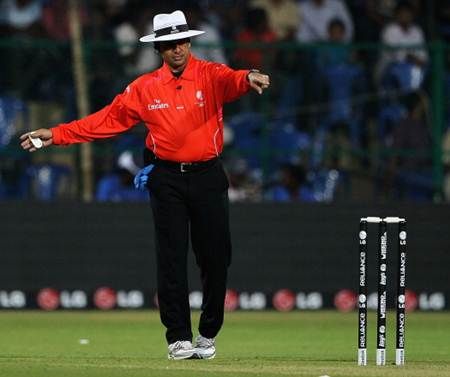 Aleem Dar has lost the confidence of the International Cricket Council after two horrible gaffes, which have left a big question mark on his career.
Aleem Dar has lost the confidence of the International Cricket Council after two horrible gaffes, which have left a big question mark on his career.
When he was not named to officiate in the two semi-finals at the World Cup there was hope that the award-winning Pakistani umpire would be considered for the final at the MCG on March 29.
Instead, last year's best umpire, Richard Kettleborough of England, and Sri Lanka's Kumar Dharmasena were named for on-field duty, South Africa’s Marais Erasmus as third umpire and England's Ian Gould the reserve official.
It seems Dar was primarily overlooked because of questionable umpiring in the high-voltage quarter-final between Bangladesh and India.
The twice ICC umpire of the year, who stood in the World Cup finals of 2007 and 2011, signalled a no-ball when Rohit Sharma was batting on 90. He ruled paceman Rubel Hossain’s delivery was above waist high even as the Indian batsman’s ensuing miscued pull was caught at square-leg.
The Bangladeshi fielders objected to the no-ball, as television replays showed the delivery was below Sharma’s waist.
Under the normal circumstances, the leg-umpire waits for some time and consults the television umpire to check whether the ball was above the waist.
Bangladesh, who had Suresh Raina's leg before appeal turned down on review in the same match, were left infuriated and after their defeat lodged a protest against the umpiring. Their incumbent ICC president, Mustafa Kamal, went to the extent of threatening to resign and alleged that the match was pre-arranged in India's favour.
Dar became a villain in Bangladesh. Protestors in Dhaka burnt effigies of him as they felt his decision robbed the team of an upset victory.
He was also at the centre of controversy on the opening day of the World Cup during the match between arch-rivals Australia and England.
At the fag end of that match he adjudged England's James Taylor leg-before wicket, but the batsman instantly challenged the decision.
Realising that Dar's decision was wrong, Australia's Glenn Maxwell ran out James Anderson, who attempted to cross over as soon as Taylor was struck on his pads. Both Dharmasena and Dar did not realise that the ball had become dead when the batsman was given out and a run-out could not be effected on a dead ball.
While Dar's LBW decision was overturned by TV umpire Billy Bowden, the Kiwi official did not correct that of the run-out and young Taylor, who was on 98 off 90 balls, missed being a centurion on World Cup debut.
As the horrendous decision exposed lack of knowledge of the umpires, the ICC had to apologise for the mistake.
The Cricket World Cup: Complete Coverage
- Apostrophe Content and Entertainment
Image: Aleem Dar
Photograph: Matthew Lewis/Getty Images











